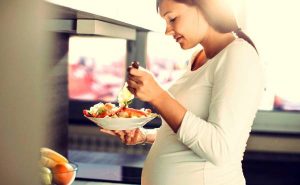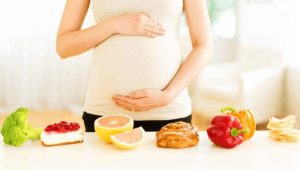What should pregnant women eat for dinner?
Many pregnant women are unaware of the importance of eating dinner during this time. Pregnant women, especially women in the third trimester, do not want to eat dinner, but they should not neglect it.
However, what should pregnant women eat for dinner? One of the things that keep mom and baby healthy is a healthy dinner plan. How should dinner be suitable for pregnancy?

The importance of a healthy diet during pregnancy:
One of the first things that worry pregnant mothers is the amount of food they should eat. However, pregnancy, especially in the last two or three months, is very tiring, so you should eat foods that keep you energized throughout the day. Although there is no need to eat for “two people,” it is not a good time for strict diets.
As a general rule, women at this stage tend to eat a lot during the day, so they should not force themselves to eat. Of course, to have a healthy pregnancy, it is essential to remember the body’s need for certain nutrients such as vitamins, minerals, or proteins.
In this regard, a good strategy can be to avoid elaborate meals. Instead, pregnant women should split their meals into meals.

What should pregnant women eat for dinner?
There are healthy foods that pregnant women can eat for dinner. However, this meal should include all the nutrients needed for a balanced diet.
This means that pregnant women should consume fruits, vegetables, carbohydrates, proteins, and fats under normal circumstances. In this way, they should all be divided throughout the day and meet their nutritional needs.
Food distribution is recommended as follows:
At dinner, half of the meal should include vegetables.
A quarter of the plate should be full of protein, which can be of animal or vegetable origin
The last meal should contain carbohydrates.
You can also combine your meal with a source of fat and healthy fruit for dessert.
What food can pregnant women eat for dinner?
As mentioned earlier, dinner should include all food groups. Of course, choosing the right foods for this meal is still very important.
Fruits and vegetables
During pregnancy, eating a variety of fruits and vegetables is allowed. However, boiling and pureeing them is the best option for dinner.
In fruits, doctors advise you to eat them ripe and avoid citrus fruits because they cause acid reflux.
carbohydrates
Whole grains such as rice, pasta, and bread are a priority for pregnant women because they can be found in various nutrients. Also, due to the presence of fiber in cereals, consuming them can help you prevent digestive problems that are very common during pregnancy.
Protein
The best source of protein for dinner is white fish, white meat, or eggs that can be grilled or grilled. The point is to prepare them with a spice of olive oil so that they do not cause indigestion problems.
On the other hand, if you prefer plant proteins, tofu or tempeh is the best option. Keep in mind that these proteins contain many essential amino acids, so animal proteins are the best option.

Quality fats
Olive oil is the best choice for fat consumption. You can also eat some extra nuts, avocado, or olives. Be careful to use moderate amounts as it prolongs digestion.
What other features should a pregnant woman’s dinner have:
We all know that some annoying symptoms may appear during pregnancy, which is not severe but may take several weeks. Fortunately, a proper diet can improve nausea, constipation, heartburn, and gastroesophageal reflux disease.

As mentioned, it is essential to follow a series of diet tips at dinner, the most important of which are:
- Avoid elaborate meals and divide your daily intake into several meals a day.
- Eat dinner at least 3 hours before bed because it improves reflux and heartburn.
- Forget sauces, cheeses, pastries, and dairy desserts because they all take longer to digest, making these symptoms worse.
- Avoid spicy foods, citrus fruits, chocolate, or fizzy drinks at dinner because they can cause heartburn and reflux.
- Eat whole grains, legumes, fruits, and vegetables because they contain dietary fiber that helps relieve constipation.
- By following these dietary guidelines, you can ensure that you have all the nutrients you need to support your baby’s growth and health.
However, it is essential to consult a nutritionist because each person is different.
Depending on the characteristics of each pregnant woman, age, current health status, and stage of pregnancy, the nutritionist may suggest other types of nutrients.


